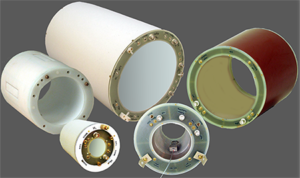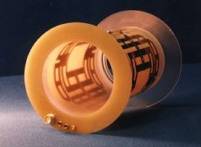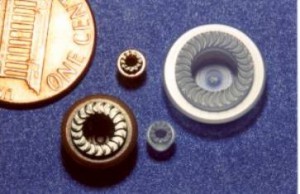Achievements
We are a small team of scientists and engineers focused on supporting the NMR/MRI researcher with custom probe development expertise and the best solids NMR and MRI-RF products in the industry. For over 30 years we have been the major force in the advance of solids probe technology, with dozens of ‘firsts’ in CP/MAS, including multi-nuclear, narrow-bore, triple-resonance, 500 MHz, SAS, 750°C, 26 kHz, 15 Kelvin, and 600 MHz. Many of these products include air-bearing-supported micro-turbine-driven all-ceramic sample spinners capable of achieving supersonic surface speeds.
We were also the first to deliver actively shielded MR microscopy gradient probes, and we now have dual frequency rf volume coils that out-perform the birdcage.

Our latest probes, re-define solids NMR by providing more than an order of magnitude improvement in resolution, a factor of two increase in decoupling strength with low decoupler heating, and versatility beyond your imagination: upgradeability, easy-to-use sealing sample cells, quad-resonance, multi-nuclear, SAS, H-F, lock, Q-switching, PFG, XVT, or all of the above! XC probes are optimized for NMR applications in liquids, tissues, and solids. Other products include fast response cryogenic temperature controllers and low-noise rf preamps. See recent papers on magnetism listed under Publications.

We have developed some of the world’s smallest microturbines for our Solids NMR Probes
We have developed some of the world’s smallest microturbines for our Solids NMR Probes
We introduced a new line of NMR probes called BMAX with rf tuning elements that significantly improve S/N (signal to noise ratio).
Smaller spinners (3 mm microturbines) have been developed which spin to speeds up to 28,000 revolutions per second.
Breakthroughs
Some of our outstanding achievements over the years
In 1982, we introduced the 7 mm MAS probe spinning 5kHz. (Others at the time were spinning 2.5 to 3 kHz with much difficulty.) This probe had such stable spinning that it could be turned upside down while spinning, an unheard of feat in those days. It was also quiet and had a new circuit that improved sensitivity.
In 1984 we were the first to introduce multinuclear 1H/X probes. In that same year, we introduced the 5 mm MAS at 9 kHz.
In 1987 we supplied our first actively shielded gradient probes.
In 1993 we introduced force-cancelled gradient probes
In 1997we introduced the XC Liquids/Solids MAS probe
In 1998 we introduced our Litz rf imaging coils.
In 2002 we introduced quadrature Litzcage rf imaging coils.
In 2006 we introduced the OptiMAS probe
In 2012 we introduced the BMAX probe which allows for higher power on the X and Y channels
In 2017 we introduced the Quad-MAS 4 channel H/X/Y/Z with 3 multinuclear channels.
In 2019 we introduced the Flourine-Quad-MAS 4 channel H/F/X/Y with a dedicated Flourine channels.
In 2019 we introduced HR Liquids and PFG probes that enable sample temperatures up to 300 C.
In 2024 we introduced a Ultra Low Temperature (ULT) probe



